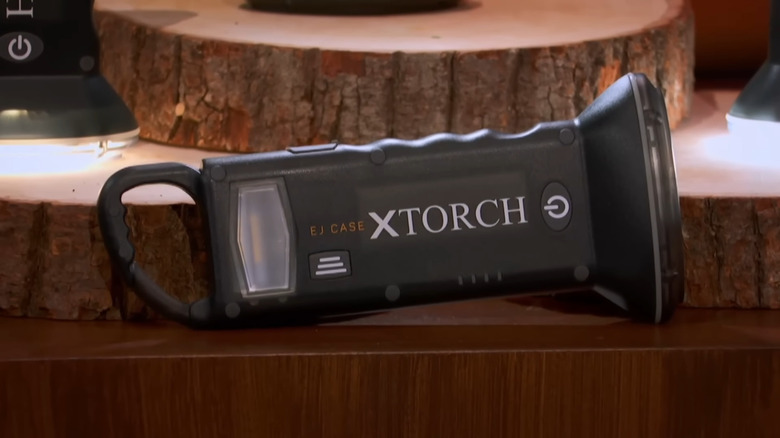Whatever Happened To XTorch After Shark Tank?
Few entrepreneurs understand the importance of having access to reliable light sources more than Gene and Keidy Palusky.
The husband and wife duo have lived in many different countries, often in areas that suffer from frequent blackouts or don't have consistent energy resources to support a continuous electric infrastructure. For instance, Keidy grew up in the Dominican Republic, experiencing a lack of light she says is common in Latin American countries. As an adult, she and her husband lived in the Central African country of Equatorial Guinea, working with a non-governmental food distribution organization. During this time, she contracted a deadly illness, and Gene had to rely on faint candlelight to administer life-saving treatment.
Thus, they developed XTorch, an extremely powerful and durable flashlight — sorry, we mean "solar-powered rechargeable light and power device" — that can stay charged for up to three years in storage. After operating on their own (mainly as a quasi-charity organization, donating their product to communities in need of light), the Paluskys managed to get a taping spot on the ABC reality investment program "Shark Tank." They hoped to team up with a savvy businessperson who could help them make XTorch as profitable as it was beneficial. Instead, one of the sharks tried to buy their entire company.
XTorch couldn't spark joy for the Sharks
Appearing on "Shark Tank" Season 12, Gene and Keidy Paulsky sought $150,000 in exchange for 10% of their company, imputing a relatively mid-range valuation of $1.5 million. It's the sort of figure that isn't an immediate eyebrow-raiser but still needs impressive sales numbers or a charismatic pitch to be attractive. Unfortunately, XTorch had neither.
As kind and intelligent as Gene and Keidy appeared to be on the show, they didn't come across as serious entrepreneurs. Profits were offset by large (and, to be clear, absolutely commendable) charitable donations in the form of free products and direct monetary support to their non-profit partners, totaling 25% of their net revenue. While this clearly shows the Paluskys are more interested in making the world a better place than they are in making themselves richer, it conflicted with their immediate aim of securing a ruthlessly profit-focused partner like a shark. It also didn't help that the XTorch itself didn't register as incredibly unique to the sharks or that Gene had difficulty answering basic questions about the product.
The sole offer they received was an arguably brutal 100% buy-out from Robert Herjavec, who proposed $500,000 in exchange for the entirety of XTorch. If a shark makes an offer for 100% equity, it's almost always either at or slightly above the valuation the entrepreneur entered the Tank with (as was the case with HyConn), or it's at a tremendous discount to them. In some ways, the latter position isn't that much better than not receiving an offer at all. The Paluskys countered for $1 million, then $750,000, but Herjavec refused to budge before withdrawing completely, leaving XTorch flickering on its way out of the "Shark Tank."
How did Shark Tank fans react to XTorch?
On Reddit, members of the r/sharktank community came together immediately after the episode aired in 2021 to discuss XTorch's dim pitch.
"Wow they were so dumb not to take Robert's deal," exclaimed u/moose_head13. "Absolutely shocked they didn't take the 500k." u/BigBoutros agreed, writing, "I couldn't believe it. They have no patents, no sales, no nothing. This company will be dead within a year and they could have cashed out." Another user, u/TDeneverFan, pointed out how the Paluskys could have potentially taken advantage of Robert Herjavec's offer without losing full financial interest in the company. "If I were them I would've tried to do like 500k for 90%, or at least something where they still get some guarantee of being on board," they wrote.
Most users decried the high cost (Gene Palusky said the XTorch cost $59.99 during the pitch), especially since they felt it lacked qualities that were unique — or, dare we say, proprietary (there was plenty of chortling about an exchange during the pitch which saw Gene needing to ask what the word "proprietary" means). Many expressed their confusion about the amount of profits going to charities. u/WildMajesticUnicorn wrote, "I'm surprised Kevin stayed in as long as he did. When I heard that they give away 25% of their profits I [thought] he would be out immediately." They later added, "They're coming asking for money while sending 25% of profits straight out the door. Most start-ups would struggle giving away that much of their profits early on."
XTorch benefited from Shark Tank Xposure
Looking back at the immediate aftermath of their "Shark Tank" episode, the Paluskys expressed nothing but positive feelings about their experience. Speaking on the NGO Interview Podcast in 2021, the couple commended the panel of judges for being gracious with them despite their lack of experience, and Keidy further recommended that anyone with an interesting product take advantage of the opportunity to audition, as they never know who might see their product as a result. While this strategy may not work for every entrepreneur, it certainly did for Gene and Keidy. After their episode aired, Gene said they sold out their entire inventory within 24 hours and received thousands of pre-order requests from around the globe (a prime example of the fading "Shark Tank" Effect).
Neither of the Paluskys regretted not selling XTorch to Robert Herjavec for $500,000, as doing so would not only undermine the effort and money they had already put into their business but potentially jeopardize the social mission they wanted their company to facilitate. Even if Robert had met them at $1 million, they would simply have started a new charitable venture. Gene told the Star Tribune, "We would just have taken that $1 million and invested it in another social program. We have ideas."
Did XTorch flame out of business?
As of writing, XTorch is still available to purchase online, though for a significant discount. Rather than the $59.99 price point Gene Palusky advertised on "Shark Tank," the product is now sold at $50 even and is on a seemingly indefinite sale for $34.98. While this wouldn't normally be noteworthy, it's worth mentioning because Kevin O'Leary strongly suggested bringing the price of the XTorch down to $29.99 — possibly even $19.99.
Even if they haven't lowered their price to Mr. Wonderful's standards, this could indicate the Paluskys felt their original number wasn't attractive to new customers in the long run. On Amazon, the XTorch is sold for $35.98. It has an average of 4.5 stars out of 5, based on about 250 reviews. The few one-star ratings claim the USB charging port is too large for older phone chords. XTorch has neither expanded its product line nor added new features to the standing product.
What's next for XTorch?
As one may have guessed after learning about the background of these Minnesotan forces for change, the Paluskys don't seem to place much importance on cultivating a social presence. Aside from maintaining a sleek company website, the XTorch Instagram account isn't the most active, and neither Gene nor Keidy have updated their profiles on LinkedIn to reflect their recent professional achievements. Gene is listed as the owner of a company called "rtc solar" — we weren't able to confirm what that company is or was. Keidy, meanwhile, is listed as a freelance translator with no other employment history.
All this to say, it's a bit difficult to discern where the company goes from here. Plenty of people — the sharks included — thought they were crazy for investing their time, energy, and money into an arguably overpriced flashlight and trying to get their business to the next level while giving away a quarter of their net profits. And yet, there's nothing to suggest XTorch is on the decline. Perhaps the couple found the right price point to attract enough new customers to keep the lights on while spreading some of those lights to those who need them the most. And if there's one other thing we can assume from the Paluskys' background, statements, and actions, it's that, for them, the chance to make a change is well worth the work.





